

Log In. Let’s Get Lunch! Group Meals Spur Cooperation. The indispensable research blog on the science of the modern workplace, covering everything from leadership and management to the behavioral, social, and cognitive dynamics behind performance and achievement.
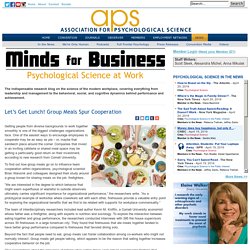
Getting people from diverse backgrounds to work together smoothly is one of the biggest challenges organizations face. One of the easiest ways to encourage employees to cooperate may be as easy as pie – or, maybe that sandwich place around the corner. Companies that invest in an inviting cafeteria or shared meal space may be getting a particularly good return on their investment, according to new research from Cornell University. To find out how group meals go on to influence team cooperation within organizations, psychological scientist Brian Wansink and colleagues designed their study around a group known for sharing meals on the job: firefighters. The team of interdisciplinary researchers included lead author Kevin M. In a 2012 study published in Psychological Science, Michael A.
Negative People are More Dangerous Drivers. Neurotic, negative people – think Larry David or George Costanza – are more dangerous behind the wheel, according to new research from the Chinese Academy of Sciences in Beijing.
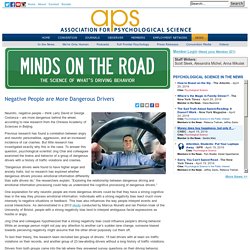
Previous research has found a correlation between angry and neurotic personalities, aggression, and an increased incidence of car crashes. But little research has investigated exactly why this is the case. To answer this question, psychological scientist Jing Chai and colleagues examined the brains and behavior of a group of dangerous drivers with a history of traffic violations and crashes. “Dangerous drivers were found to have higher anger and anxiety traits, but no research has explored whether dangerous drivers process emotional information differently than safe drivers do,” the researchers explain.
“Exploring the relationship between dangerous driving and emotional information processing could help us understand the cognitive processing of dangerous drivers.” References. Can Leadership Potential be Predicted at Age 10? The indispensable research blog on the science of the modern workplace, covering everything from leadership and management to the behavioral, social, and cognitive dynamics behind performance and achievement.
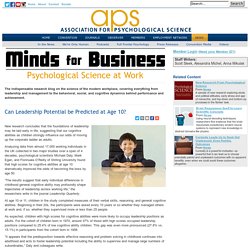
New research concludes that the foundations of leadership may be laid early in life, suggesting that our cognitive abilities as children strongly influence our odds of moving up the corporate ladder as adults. Analyzing data from almost 17,000 working individuals in the UK collected in two major studies over a span of 4 decades, psychological scientists Michael Daly, Mark Egan, and Fionnuala O’Reilly of Stirling University found that high scores for cognitive abilities at age 10 dramatically improved the odds of becoming the boss by age 50. “The results suggest that early individual differences in childhood general cognitive ability may profoundly shape trajectories of leadership across working life,” the researchers write in the journal Leadership Quarterly.
Reference. Pupil response predicts depression risk in kids. How much a child's pupil dilates in response to seeing an emotional image can predict his or her risk of depression over the next two years, according to new research from Binghamton University.
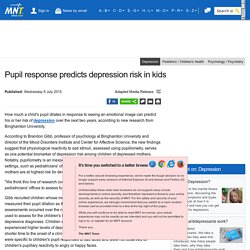
According to Brandon Gibb, professor of psychology at Binghamton University and director of the Mood Disorders Institute and Center for Affective Science, the new findings suggest that physiological reactivity to sad stimuli, assessed using pupillometry, serves as one potential biomarker of depression risk among children of depressed mothers. Watching TV might slow your brain. Watching extended amounts of TV might be linked to cognitive decline.
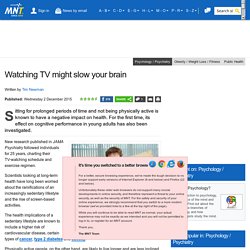
Premature birth associated with introversion in adulthood. The study suggests that, for some individuals, the physiological circumstances of birth could explain career and relationship difficulties in adulthood.
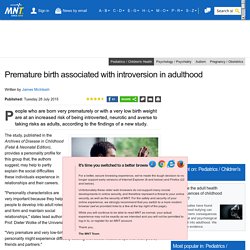
The study, published in the Archives of Disease in Childhood (Fetal & Neonatal Edition), provides a personality profile for this group that, the authors suggest, may help to partly explain the social difficulties these individuals experience in relationships and their careers. "Personality characteristics are very important because they help people to develop into adult roles and form and maintain social relationships," states lead author Prof. Childhood Amnesia: The Age at Which Our Earliest Memories Fade. Neurotic People Have A Surprising Mental Advantage. Over-thinking worriers enjoy this unexpected psychological advantage.
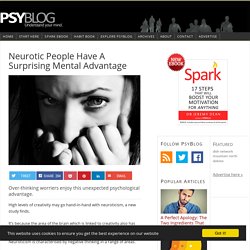
High levels of creativity may go hand-in-hand with neuroticism, a new study finds. It’s because the area of the brain which is linked to creativity also has the tendency to over-think things and worry. Neuroticism is characterised by negative thinking in a range of areas. What’s “Fair” Depends on Where You Come From. The mentality that “you get what you earn” is widely accepted as what is “fair” in most Western societies.
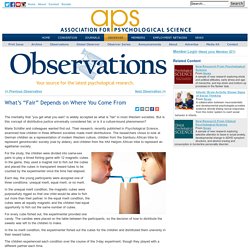
But is this concept of distributive justice universally considered fair, or is it a culture-bound phenomenon? Marie Schӓfer and colleagues wanted find out. Their research, recently published in Psychological Science, examined how children in three different societies made merit distributions. The researchers chose to look at German children as a representation of modern Western culture, children from the Samburu African tribe to represent gerontocratic society (rule by elders), and children from the ≠All Hai||om African tribe to represent an egalitarian society. Premature birth associated with introversion in adulthood.
This Eye Colour Linked to Being More Competitive, Egocentric And Skeptical. Eye colour could reveal an aspect of your personality, study finds.

Lighter eyes have been linked to more egocentric, competitive, skeptical individuals, research finds. Darker eyes, though, are linked to sympathy, altruism and a higher altruistic behaviour. The neuroscience of ADHD. Mitch Blunt Neurobiologist David Anderson is alarmed by the idea of drugging children to treat the symptoms of attention deficit hyperactivity disorder (ADHD).
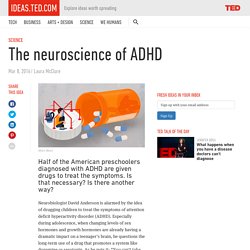
Especially during adolescence, when changing levels of sex hormones and growth hormones are already having a dramatic impact on a teenager’s brain, he questions the long-term use of a drug that promotes a system like dopamine or serotonin. Memory Recall Is Tripled By An Easy 'Self-Imagination' Technique, Study Finds. For both healthy people and those with memory problems, the technique improved recall dramatically. Imagining how things relate to yourself helps to boost recall, psychological research finds. The study tested people with and without memory problems and found it could help both. In the study people were asked to remember a series of words related to personality traits. For each word, they used one of five different strategies: think of a word that rhymes with the trait (baseline),think of a definition for the trait (semantic elaboration),think about how the trait describes them (semantic self-referential processing),think of a time when they acted out the trait (episodic self-referential processing),or imagine acting out the trait (self-imagining).
The results showed that whether people had memory problems or not, self-imagining was the most effective strategy. Psychiatric diagnoses in young transgender women. About 41 percent of young transgender women had one or more mental health or substance dependence diagnoses and nearly 1 in 5 had two or more psychiatric diagnoses in a study of participants enrolled in a human immunodeficiency virus (HIV) prevention intervention trial, according to an article published online by JAMA Pediatrics. Transgender youth - including adolescent and young adult transgender women assigned a male sex at birth who identify as girls, women, transgender women, transfemale, male-to-female or another diverse gender identity on the transfeminine spectrum - are a vulnerable population at risk for negative mental health and substance use outcomes. Sari L. Resiner, Sc.D., of Boston Children's Hospital/Harvard Medical School, Boston, and coauthors used a diagnostic interview in an at-risk sample of young transgender women to assess the prevalence of mental health, substance dependence and coexisting psychiatric disorders.
2 Factors Found To Underlie Obsessive-Compulsive Disorder. What really underlies obsessive-compulsive disorder? Confusing imagination with reality and being out of contact with reality are linked to OCD, a new study finds. People with OCD (obsessive-compulsive disorder) are known to dissociate themselves from reality. The Unexpected Reason You Should Watch a Real Tearjerker Of A Movie.
Study tested how people feel 90 minutes after watching a tearjerking film. People who watched a sad film were eventually in a better mood after watching it than they were before, a recent study found. However, it took about 90 minutes, on average, to feel better after crying. The Female Body Shape Men Find Most Attractive. From Texas to Tehran and from Dakar to Beijing, the results were the same.
Women who are almost underweight are most attractive to men, a recent study finds. Violent, sexist games decrease empathy for real-life female victims, says study. Violent games that let players abuse women could have real-world effects, a new study suggests, with young men who identify with the games' male protagonists ending up less likely to care about women in real life. A team of researchers in Italy and the United States found that a group of male high schoolers in Italy who played Grand Theft Auto reported feeling less sympathy when shown photos of female victims of violence.
"One of the best predictors of aggression against girls and women is lack of empathy," reads the study, conducted by researchers from the University of Milano Bicocca in Italy and Ohio State University in the US and published Wednesday in the journal PLOS One.